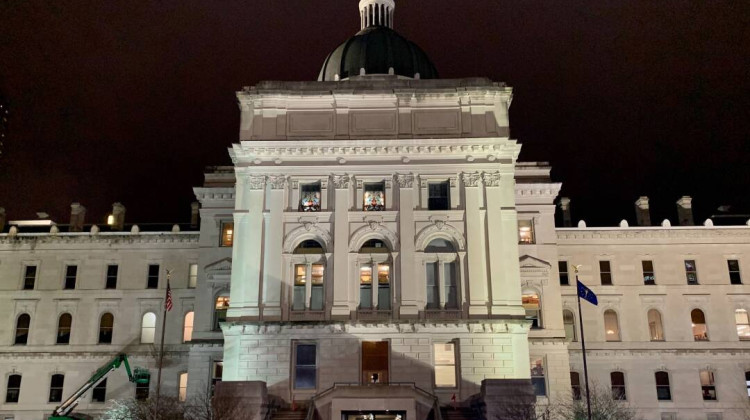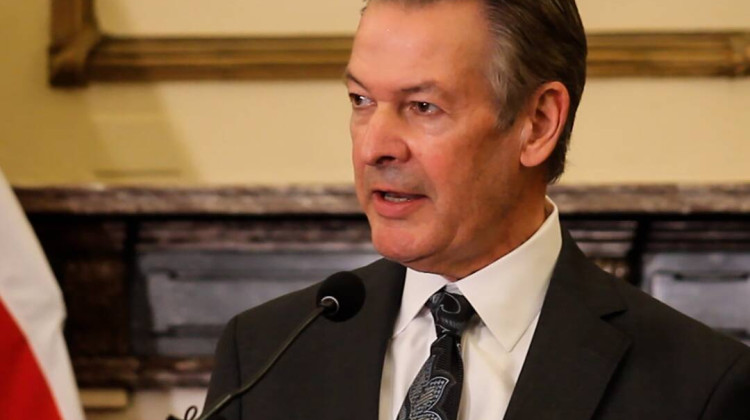
Beth White (left) and Destiny Wells (right) both vie for the Democratic nod for attorney general in 2024.
Courtesy of the White and Wells campaigns.On Saturday, the Indiana Democratic Party will host its own convention to nominate its candidates for lieutenant governor and attorney general — similar to the Republican Party’s convention last month in which delegates chose Noblesville pastor Micah Beckwith over party favorite Julie McGuire.
Two women have stepped up as candidates for attorney general: Lt. Col. Destiny Wells and former county clerk Beth White. Both described the actions of the office’s current inhabitant — Indiana Attorney General Todd Rokita — as a disservice to Hoosiers and decried his partisan approach to the largely technocratic office.
“He’s not doing what he can be doing or could be doing to protect people,” White said. “I think that the Attorney General’s Office has just been politicized by Todd Rokita in a way that’s not helpful to Hoosiers.”
Even advisories have taken a turn for the political, White said, including one on the use of preferred pronouns in the workplace.
Wells previously worked in the office under former Attorney General Curtis Hill. Morale under both officeholders has fallen after repeated controversies, she said, and dozens of experienced attorneys have left to pursue other opportunities.
“I think the more partisan the office has gotten … (and) leadership having a partisan agenda really degrades the work of the attorneys,” Wells said.
Recruiting the next level of attorneys and improving the health of the office would be two of the biggest challenges, Wells said, upon assuming office. But there are also transformative opportunities, like adding a position to oversee labor law violations like the Illinois Attorney General’s Office.
“We need to reimagine how that office can better help Hoosiers,” Wells said.
Candidate particulars
Wells said her journey in politics “was always about” the Office of Attorney General, where she was a deputy attorney general for government litigation. But in 2020, Wells said she was “too new” to run for the office, instead opting to run for secretary of state in 2022 — a race she lost on a 54-40 vote to current officeholder Diego Morales.
“I’m really glad I did that because that was the preparation I needed to actually run for attorney general,” Wells said.
One of the reasons that 2024 will be different from 2022, Wells said, was because of the timing of the election with national races. In 2022, Morales was one of many right-wing candidates and “nobody was focused on Indiana.”
But in 2024, just a dozen states have attorney general elections and the Democratic Attorneys General Association has identified Indiana as a “potential flip” in an undated DAGA memo. Sabato’s Crystal Ball has moved the race from Safe Republican to Lean Republican, signaling weakened support for the incumbent after a public reprimand following his actions in a case involving an Indianapolis doctor who performed an abortion on a 10-year-old rape victim.
“It would be a heavy lift for any Democrat to beat Rokita — no Democrat has won a statewide contest in Indiana since 2012 — but a Democratic win is no longer outside the realm of possibility,” Saboto’s Crystal Ball concludes.
Wells enlisted in the Army National Guard at 19, working her way up to lieutenant colonel — a position she has held since 2003, according to her LinkedIn. Currently, she holds a position as the Indiana Democratic Party’s deputy chair for coalitions and expansion.
White, on the other hand, is the president and CEO of the Indiana Coalition to End Sexual Assault and Human Trafficking but previously won back-to-back terms as Marion County Clerk between 2006 and 2014.
“My career has provided tremendous opportunities, not only for me to work and have (experience in) those different spaces, but also for me to understand the relationship between federal government, state government (and) local government,” White said.
She likened a campaign to a long job interview but said she had what it took to actually execute those duties once in office.
“All of those things really have helped prepared me. Not only to be an effective leader as an attorney general but also to understand the relationships that the attorney general has to navigate. And I have many of those relationships already,” White said.
On Todd Rokita
Both candidates said that friends within state government have reported simple tasks taking an inordinate amount of time if the Office of the Attorney General is involved, such as approving contracts or routine legal work.
Some attorneys have fled the office, which has several expensive contracts with outside attorneys for work that could be handled by state employees.
“When I went in there, I was surrounded by all these people who had these enormous dockets — which I eventually had — but everybody was very helpful. It was very much a team effort.
But Wells said the office lacked leadership at the top levels, noting that she only saw Hill once during her tenure. Everything felt like it was left until the last minute, she said — including multimillion dollar settlements — while one-on-one mentoring partnerships and staff training were left to the wayside.
“All these things that have been instilled in me from being a senior officer in the military now were absent. These are just basic principles I would expect to also see in corporate America,” Wells said.
Though Wells left the office before the transition, she said she still hears about the same lack of morale and absent leadership in the office under Rokita due to his partisan approach.
For instance, though Rokita has put out several versions of a “Parent Bill of Rights,” Wells said he has overlooked children who are sometimes harmed by those very decisions. During her time practicing family law, Wells said she saw parents who opted to homeschool their children but neglected to teach them age-appropriate basics.
“I then have seven- and eight-year-olds who, because their moms took them out, do not know how to read. They do not know how to write … Administrators come in and say they’ve been socialized like they’re in a cage,” Wells recalled.
White said Rokita has “extreme positions” on reproductive choice, abortion rights, medical privacy — “or the lack thereof” — and gender identity.
“We, the people of Indiana, have got to have an attorney general who’s behaving differently,” White said. “I’m motivated by seeing what’s happening and being discouraged — and, frankly, full of a little bit of despair. And I decided to channel my despair into action.”
With White’s position combating sexual assault and human trafficking, the office’s opposition to Title IX changes that included updated language on gender identity hurt the college students who needed her services. Indiana told its schools to ignore those guidelines, which also includes requirements for addressing sexual violence, serving pregnant or breastfeeding parents and more.
“It’s an ideological battle that he is fighting that is not helping — it is hurting,” White said. “Todd Rokita doesn’t care about (those things), because he’s decided that we should just ignore the federal regulations,” White said. “… he needs to stop getting involved in ideological battles that have nothing to do with making Hoosier lives better.”
For White, politics is a combination of timing, preparation and luck — and timing plays a crucial role due to the actions of Rokita, she said.
“Elections are about choice and the people of Indiana are going to have a very stark choice, even if I don’t succeed at the convention.”
The other convention race
The race between Wells and White won’t be the only contest on Saturday’s calendar — four other Hoosier politicians have thrown their hats in the ring to compete alongside Democratic gubernatorial nominee Jennifer McCormick.
McCormick’s top choice, former state Rep. Terry Goodin, was controversial for some due to his conservative voting record on abortion and gay marriage — seemingly at odds with McCormick’s campaign focus on reproductive choice.
Three others have filed to challenge Goodin: perennial candidate Bob Kern, Indianapolis’ Clif Marsiglio and Tammie Dixon-Tatum, who fell short on ballot signatures when running to challenge McCormick.
Notably, the Indiana Democratic Party doesn’t allow contenders to address delegates unless they’ve been nominated by a delegate and receive a second from another delegate. At least one candidate has reportedly struggled to find two supporting delegates.
“It has been a rule of the convention for decades that a candidate for state office must be nominated by a delegate and a ‘second’ from a separate delegate on the floor in order to have their name placed on the ballot for nomination. This remains the case for this convention and the rules haven’t been altered this year in that regard at all,” Democratic spokesperson Sam Barloga told the Indiana Capital Chronicle.
Signs are allowed in the hall or on the floor but not behind candidates as they speak. The convention is set to be held at the Indiana Convention Center in downtown Indianapolis on Saturday afternoon.
 DONATE
DONATE








 Support WFYI. We can't do it without you.
Support WFYI. We can't do it without you.